Table of Contents (click to expand)
Laplace’s Demon is a thought experiment in determinism that describes a being that knows the present, and through it, the past and future.
Laplace’s Demon is, unfortunately, not a mythical creature with horns that haunts Laplace, Louisiana. Instead, it is a thought experiment described more than two centuries ago.
Albert Einstein wrote in a letter a line that is now famously condensed into “God does not play dice with the universe.” It wasn’t anything spiritual; Einstein was expressing that there is order in the universe, as a way of rejecting randomness.
This brings us to determinism, which gives us the picture of the entire universe as just an infinite series of dominoes that have been set up to fall and cannot be disrupted. It’s an idea that has interested both philosophers and physicists alike. Laplace’s Demon has through time come to represent determinism.

Causal Determinism
Causal determinism is the idea that everything that happens is caused by everything that happened before it. The events of today are the result of the events of the past, and the events of the present will therefore cause the events of the future. It then follows that everything has been predetermined since the beginning of time.
This would also mean that there is no such thing as free will. Everything that we do is determined—cause and effect. The past causes the present. The present causes the future. Wild, right?
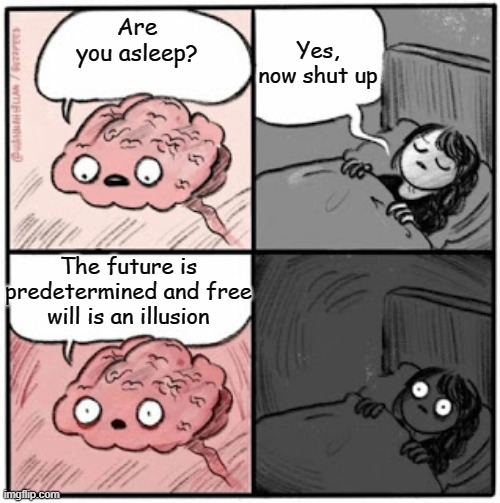
The deterministic model of the universe is far from widely accepted, especially by the scientists of today.
But now, let’s look at Pierre-Simon Laplace and the demon he created from these ideas.
Also Read: Why Does Time Only Move In One Direction?
Laplace’s Demon
Pierre-Simon Laplace described a thought experiment in 1814 in his book, A Philosophical Essay on Probabilities. This idea would later come to be known as Laplace’s Demon.
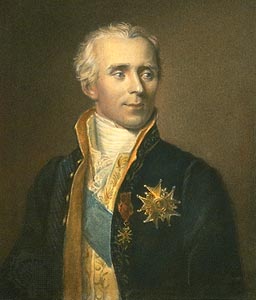
Laplace writes:
“We ought then to regard the present state of the universe as the effect of its anterior state and as the cause of the one which is to follow. Given for one instant an intelligence which could comprehend all the forces by which nature is animated and the respective situation of the beings who compose it – an intelligence sufficiently vast to submit these data to analysis – it would embrace in the same formula the movements of the greatest bodies of the universe and those of the lightest atom; for it, nothing would be uncertain and the future, as the past, would be present to its eyes.”
Let’s break it down.
What we now call Laplace’s Demon is an imaginary being. This being knows everything about everything in the state of the universe at one particular moment. It also has the computational capability to grasp that knowledge, understand and analyze it.
When you say everything in the universe, you mean everything. The movement patterns of subatomic particles, every detail about every force that is at work in the universe, the position of and velocity of every single particle. From electrons to airplanes to stars.
Basically, a whole lot more detail than even Dr. Strange could see!
So, if there was a being, with that knowledge, and the capability to understand and analyze that knowledge, then that being would be able to predict the future and describe the past perfectly. True omniscience.
Why? Because a deterministic reality is assumed as a fact. Laplace’s thought experiment regards “the present state of the universe as the effect of its anterior state and as the cause of the one which is to follow.” The present is the effect of the past and the cause of the future.
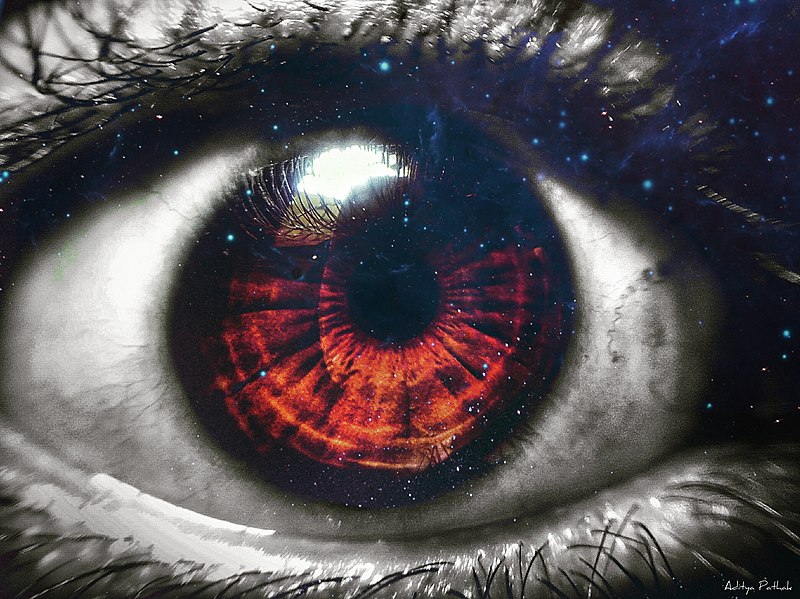
Thus, if you possessed total, detailed knowledge about the universe at one instant and intelligence sufficient enough to analyze all that data, that knowledge would make you capable of describing any instant in the past or the future.
To put it simply, if you knew everything about a particular instant, then you would know everything about every other instant in the past and future.
Also Read: What Is Maxwell’s Demon?
Challenges To Laplace’s Demon
It has been two centuries since Laplace proposed this thought experiment. It has had some support, but also a lot of strong arguments against it. Let’s take a look at the major ones.
Quantum Mechanics
Quantum mechanics doubtlessly presents an indeterministic model of the universe. It presented the biggest challenge to the deterministic model of thinking. Quantum mechanics says that subatomic particles don’t really obey the rules of classical mechanics. You cannot predict behavior, you can only really cite probabilities. Our demon needs accuracy, not probability, so the problem there is clear.
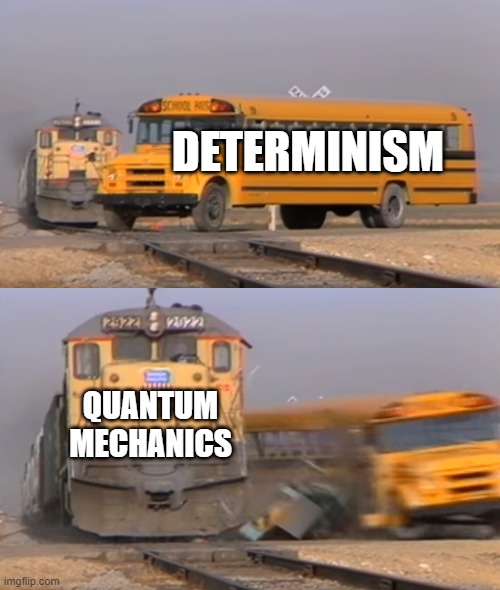
Heisenberg’s uncertainty principle, mainly, is the undoing of Laplace’s Demon. The principle states that we cannot simultaneously determine both the position and velocity of a particle. Certainty of one of them increases the uncertainty of the other. Since the demon needs to accurately know the position and velocity of every particle in the universe in order to be able to make predictions, the uncertainty principle makes that impossible.
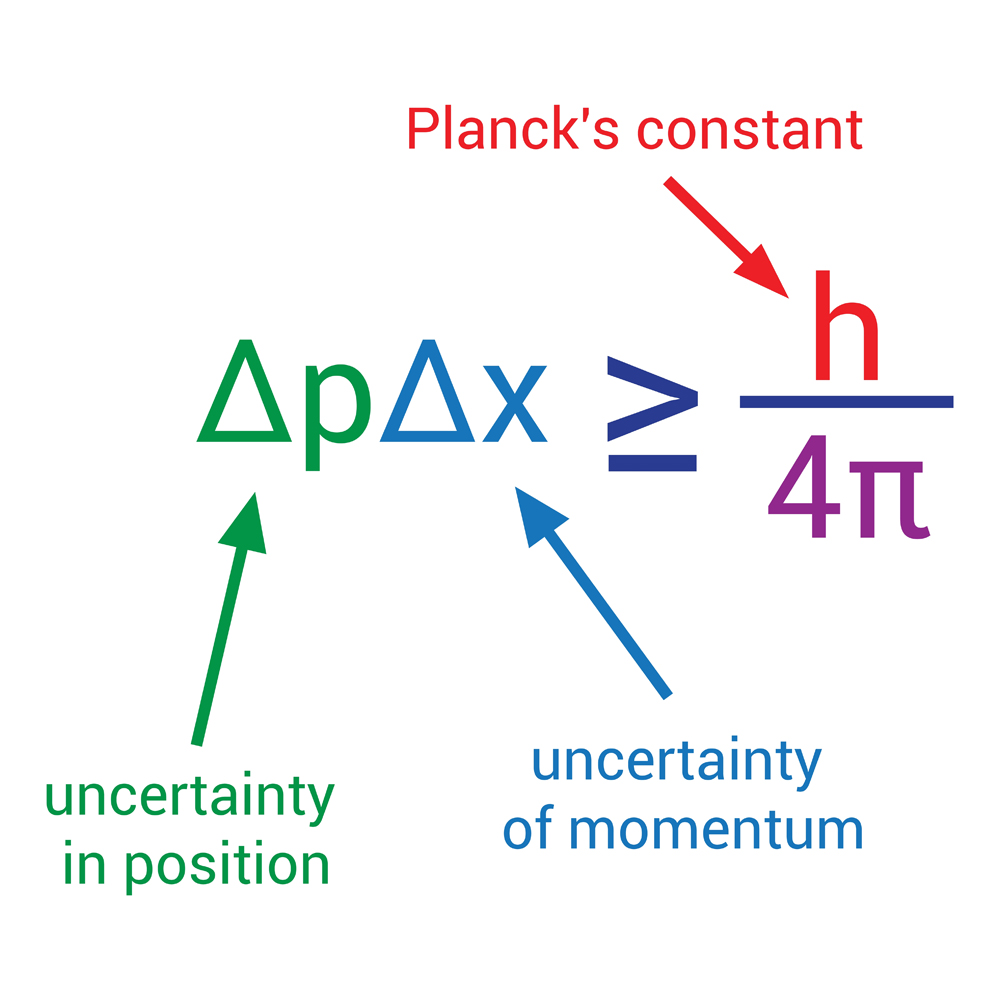
Particles can be represented by a wave function containing the position and speed, which can be determined. However, even this degree of determinism is also contested by the existence of black holes. It is simply not possible to predict the final state of things that go into a black hole.
Entropy
The second law of thermodynamics brings with it the concept of entropy. Entropy is disorder, and the entropy of a system always increases. The entropy of the universe always increases. Thus, a system will become more and more disordered with time, and become more and more difficult to predict with any sort of accuracy.
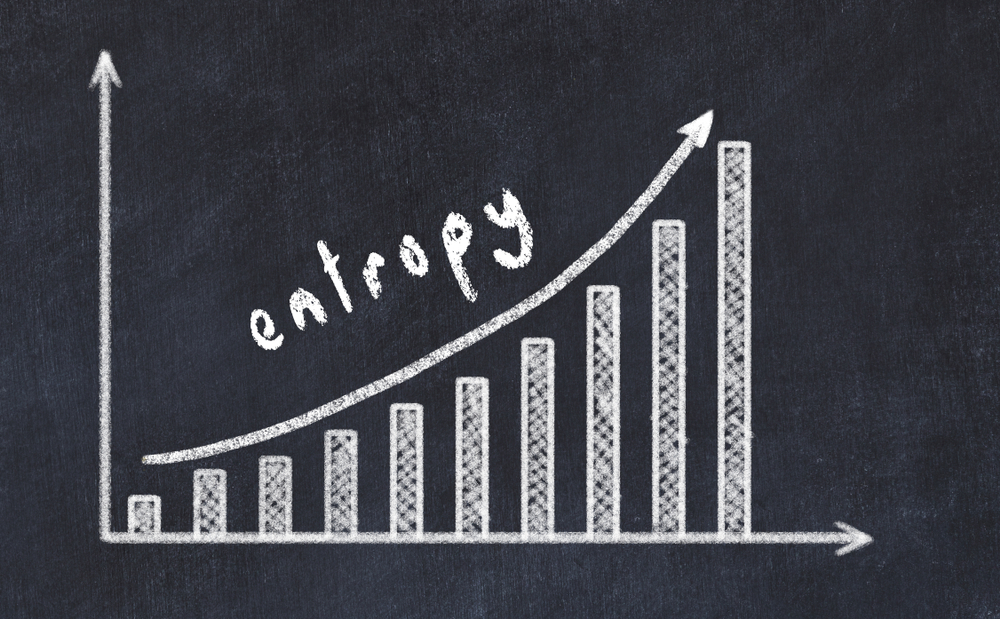
Laplace’s Demon is also supposed to determine the past by reverse-engineering the present. However, the concept of thermodynamic irreversibility throws a wrench into this. Some things simply cannot be restored to the initial state they were in. It becomes impossible to tell what the initial state was by examining the present state.
Chaos Theory
Chaos theory has several components. The butterfly effect is one common one. It is often used to signify the big impacts of small actions and all that. But it’s really about unpredictability. A butterfly flaps its wings, and a tornado may be caused, but it may also just cause a mild wind somewhere far off. We can’t know with certainty.
Minute changes translate into huge variations. Even if you know all the variables in a system, with enough iterations, the system can behave unpredictably.
Free Will
The concept of free will and that of determinism do not mix. So what does that mean for the demon?
Laplace’s Demon must also have perfect knowledge of itself. A being with perfect knowledge of the past and future would have the ability to break free of those predictions—free will. Thus, Laplace’s Demon would have the ability to disprove itself. The argument is that the prediction of the outcome of a system from within the system is impossible.
The simplest disproval of the demon is usually made with an illustration of free will.
Say, the demon did exist. You have two doors in front of you leading to the same hall. You ask the demon which door you will go through. Whichever door the demon predicts, you have the ability to choose the other one. Free will.

Now, what if the demon was, say, a disembodied entity that did not interfere with the universe? This also doesn’t work because any prediction from outside of a system can only be approximate. An accurate prediction of a system cannot be made without even the slightest of interactions with the system.
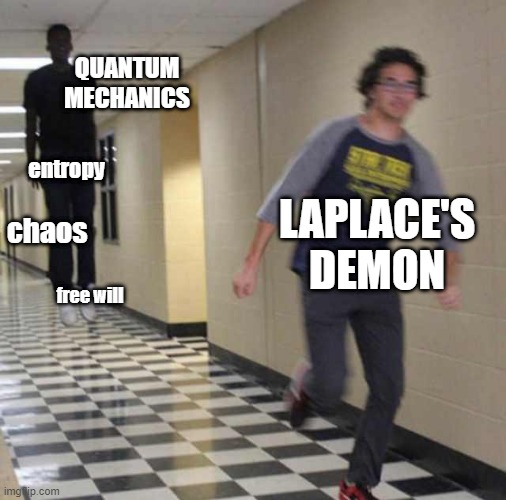
Does God Play Dice?
Stephen Hawking addresses Laplace’s Demon in one of his lectures. He claps back at Einstein’s words about God and dice, saying that God does indeed, play dice with the universe.
If you knew everything about a moment, could you really know everything about the past and the future?
If we take into account quantum mechanics and chaos and all the rest, Laplace’s Demon simply cannot exist.
Even so, Laplace’s Demon is a key concept that goes quite a ways towards understanding the deterministic model of the universe. The concept of determinism has had undeniable value, as science has heavily relied on the principle of cause-and-effect for ages.
The universe is a vast and potentially unsolvable puzzle. There is very little certainty involved in anything, but every great idea attempts to dissolve some of that uncertainty.
How well do you understand the article above!

References (click to expand)
- (2003) Causal Determinism - Stanford Encyclopedia of Philosophy. The Stanford Encyclopedia of Philosophy
- Josef Rukavicka. (2014). Rejection of Laplace’s Demon. The American Mathematical Monthly. Informa UK Limited.
- Does God Play Dice - Stephen Hawking. hawking.org.uk
- “An argument for indeterminism” by Karl Popper — Francois Ascani's Research - www.soest.hawaii.edu:80
